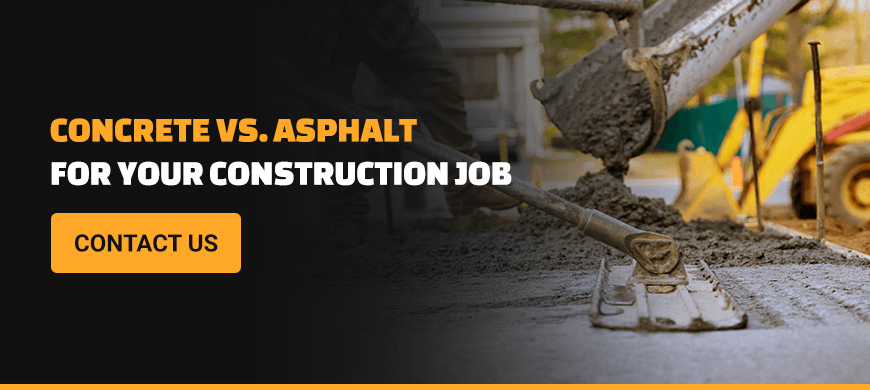Concrete vs. Asphalt
Posted On: 04/22/2022 | Posted by: DY Concrete Pumps

When you need a hard surface for construction, especially for paving jobs like roads and driveways, one of the choices you may be considering is concrete vs. asphalt. Which is the better choice? Is concrete stronger than asphalt? Why is asphalt used for roads rather than concrete? Here’s what you need to know about the benefits of concrete vs. asphalt and vice versa.
Benefits of Concrete
One of the main benefits of concrete is how long it lasts. It gets harder the longer you use it, so once you have laid down concrete, the job is essentially done.
Though it gets stronger as it hardens, concrete is highly versatile because of its malleable form when mixed. It can easily adapt to all kinds of surfaces and shapes.
Concrete is highly durable and resistant to cracking, stripping, rotting, rutting, losing its texture and other types of wear and tear that flexible pavement surfaces experience. Because it’s less prone to various types of defects, concrete is also low maintenance, which leads to a longer lifespan. Some concrete buildings can last up to 100 years or longer without severe deterioration.
Concrete may even stand up to fire, wind and water without structural damage, which is why it often lasts longer than other building materials. This is one reason why concrete is great for roads and highways, as less maintenance means less road construction and fewer traffic delays.
That being said, in severe cold, your concrete could experience cracking if you do not de-ice it properly.
Benefits of Asphalt
Asphalt is cheaper to install than concrete, but it doesn’t last as long and requires more maintenance. This is one of the primary differences between concrete and asphalt. On the other hand, if you get a crack in your concrete, you are pretty much stuck with it unless you want to tear it up and redo it. With asphalt, you can easily repair most damage.
Asphalt is also entirely recyclable. In fact, it’s the most recycled material in the United States. Nearly 99% of reclaimed asphalt makes up most new and rebuilt roads. One of the main reasons for using asphalt on roads is it absorbs road and highway traffic noise, making it a suitable pavement option.
All types of asphalt also have water-draining properties. While some types of asphalt redirect water to grassy areas, others are porous and enable water to seep through and filter the water back underground. This helps manage water on the roads and provides skid resistance, making the pavement safer for pedestrians and cars. However, asphalt roads are less durable and more prone to cracks.
Concrete vs. Asphalt Driveways
There’s no clear best choice between concrete and asphalt when paving your driveway. Many homeowners prefer asphalt because it can cost about half as much to put down as a professional concrete driveway, and you can start using it almost immediately. With concrete, you should wait about a week before driving on it. Furthermore, even though concrete lasts longer, a good asphalt driveway can work for you for as long as 20 years.
If you live somewhere with extreme weather conditions, asphalt may also be preferable because it shrinks and expands with temperature changes, whereas concrete may crack.
On the other hand, some people feel that concrete often looks nicer, and once it’s down, assuming it doesn’t crack, you really don’t have to worry about it at all for decades. That means it’s possible you may save money with concrete in the long run.
Concrete vs. Asphalt Roads
You might automatically assume that asphalt is preferable to concrete when it comes to paving roads. There would be good reason for that assumption, as 94% of all U.S. pavements are made of asphalt. However, the choice is no longer so obvious.
The main reason local governments have chosen asphalt was due to cost. But the price of asphalt has risen, and so the greater lifespan of concrete has become a much more important factor. In addition, high traffic areas are better suited to concrete because they can take more punishment from heavy vehicles like SUVs and trucks than asphalt can.
What to Consider Before Choosing Between Concrete and Asphalt
Before deciding on which material to use for your project, consider a few factors that may influence your choice and help you determine which one is right for the job.
General Maintenance
When working with asphalt, you must keep in mind you’ll need to re-seal the surface every few years and complete any other maintenance or repairs it requires. Concrete doesn’t require this regular maintenance because of its durability, but if cracks should appear, they’re easier to fix in asphalt than concrete. While asphalt is generally less expensive, continuous maintenance costs over time may equal the cost of long-lasting concrete.
Environmental Impact
Asphalt paving materials are more environmentally friendly because of their recyclable qualities. Asphalt can be ground up and reused for other applications and purposes. While it’s possible for concrete to be recycled, the process is more complex and depends on its size, shape and type.
It’s important to consider this and see which material suits your construction needs more effectively. You should also consider the climate in the area. While asphalt is better for colder, snowy climates, concrete is more effective in warmer and hotter temperatures. Asphalt pavements can become soft in extreme heat and produce oil, whereas concrete can withstand high temperatures.
Concrete vs. Asphalt for Your Construction Job
What does all this say about whether you should choose concrete or asphalt for your construction job? Again, it usually comes down to the basic factors of cost vs. durability. Pay a little more with concrete and enjoy a tough surface that can last almost indefinitely. Save some money now with asphalt, but prepare for more repairs and a shorter overall life. The choice is yours.
If you choose concrete and need help finding concrete pumps to do the job, contact DY Concrete Pumps today.


 1-844-397-8677
1-844-397-8677



